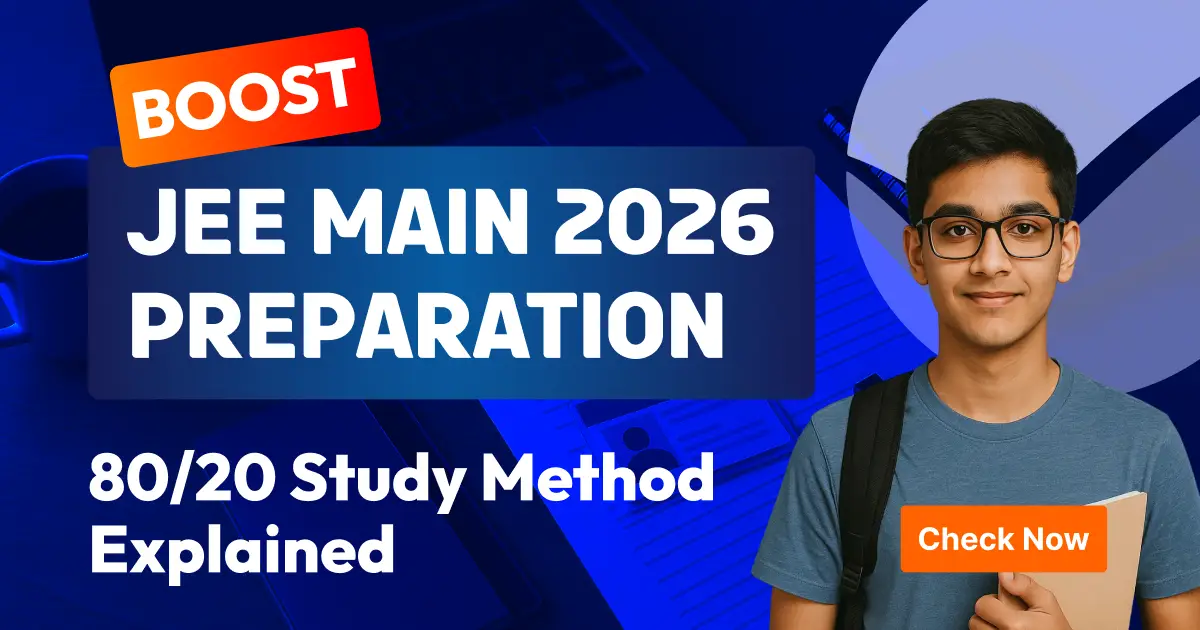JEE Main 2026 Preparation: 80/20 Study Method Explained, Check Now

SHARING IS CARING
If our Website helped you a little, then kindly spread our voice using Social Networks. Spread our word to your readers, friends, teachers, students & all those close ones who deserve to know what you know now.
The 80/20 rule, also known as the Pareto Principle, can also be applied to the Joint Entrance Examination Main (JEE Main).
Typically, you identify a few key chapters, and approximately 20 percent of the chapters account for 80 percent of the question paper, meaning 80 percent of the questions are from those 20 percent of chapters alone.
👉 Read Also - JEE Mains Session 1 2026 Registration - Dates, Fees and Direct Link Apply
If you cover those chapters thoroughly, you won't need to study the rest. I'm not saying these statistics are accurate, but you can understand that covering a few key chapters can lead to higher marks than trying to cover all the chapters equally.
We should be judicious in our studies and try to specialize in a few key chapters. In fact, we may need to identify topics within those chapters and then use PYQ to determine which chapters are most repetitive. Based on this, we can see which chapters we should focus on.
👉 Read Also - JEE Main 2026 Aadhaar-Based Registration: Check New Application Process
👉 Read Also - JEE Main 2026: 3 Months Preparation Strategy to Score High; Check Now
Key Chapters to Focus On: Quick Reference Table
| Subject | High-Yield Chapters (Focus Areas) | Low-Yield Chapters (Skip/Light Study) |
|---|---|---|
| Physics (Class 11) | Thermodynamics, Thermal Properties, Mechanical Properties, 2D Motion, 1D Motion | Rotation |
| Physics (Class 12) | Electrostatics, Magnetism, Experimental Physics (Screw Gauge, Vernier Caliper, Galvanometer), Error Analysis | Semiconductors (moderate questions) |
| Mathematics | Calculus, Conic Sections, Vector 3D, Statistics | Permutations & Combinations |
| Chemistry | Inorganic Chemistry (straightforward questions) | - |
Take physics, for example. Class 11 covers thermodynamics, thermal properties, and mechanical properties. There's also 2D motion and 1D motion. Class 12 covers electrostatics, magnetism, and semiconductors.
It's clear that we don't get many questions from chapters like rotation, which is typically a very challenging and demanding chapter.
Most chapters that include the word "errors" in them, such as screw gauges, vernier calipers, or galvanometers, or practical chapters like semiconductors, see a significant number of questions in exams. Just look at how many questions come from either chapter.
These are subject-specific, varied, and revised. But when deciding where to focus your energy, it's important to consider which one offers the most reward for the least effort. In other words, prioritize quality over quantity—and follow the brief carefully and precisely.
👉 Read Also - Big Breaking: No Calculator Allowed in JEE Main 2026 - Confirms NTA
Similarly, Mathematics also has standard chapters—calculus, conic sections, and 3D vectors. Statistics is also included; I use these easy chapters to start with because there's a question in almost every standard unit. We spend so much time studying P&C, but we don't get many questions.
And, in Chemistry, for example, there are some areas, like inorganic chemistry, where we know we'll get simple questions and don't need much effort to understand. So the basic premise is this: we can find chapters or concepts that aren't exactly in the 20% range, but we can find them and, by focusing on them and completely ignoring other areas, score some good marks.
👉 Read Also - Documents Required for JEE Main 2026 Registration - Step by Step Guide
The point is not just to study more, but to study smarter so we can maximize our results with limited effort. In addition, students should also pay attention to time management and revision.
Some candidates reread everything haphazardly, which, as a result, leads to confusion when it comes to the exam.
Having fewer Post-its and more mock papers would be a better way to improve your performance. It's also important to avoid stress, as maintaining a calm and positive mind will reduce mistakes.
The point isn't to study too often or waste hours on haphazard reading, but to study with all your heart.
👉 Read Also - NTA Exam City Rule Changed 2026: No Exam City Choice for JEE
Additional Tips for Success
1. Time Management and Revision
Mock Tests: Take more JEE Main Mock Tests instead of just reading notes. Mock tests help you understand the exam pattern and improve your time management skills.
Regular Revision: Don't make the mistake of reading everything over and over again. Review important notes and formulas regularly to avoid confusion during the exam.
2. Mental Health
Calm and Positive: It's important to remain calm and positive during preparation. A calm mind reduces mistakes.
Purposeful Study: Instead of studying for long periods of time haphazardly, study with a clear objective and a smart strategy. Your goal should be to achieve maximum results, not just study for more hours.
The 80/20 rule emphasizes smart study and the ability to score better marks with less effort. This strategy will make your preparation more efficient and focused.
-
👉 Read Also - JEE Main 2026 Registration: Important Advisory Issued for BTech Applicants, Check Details
JEE Main & Advanced Study Material







 Profile
Profile Signout
Signout












 Quiz
Quiz
 Get latest Exam Updates
Get latest Exam Updates 










